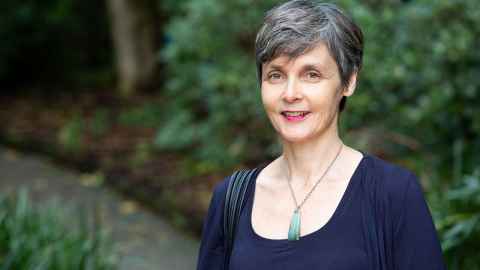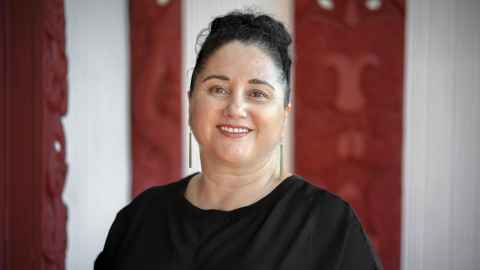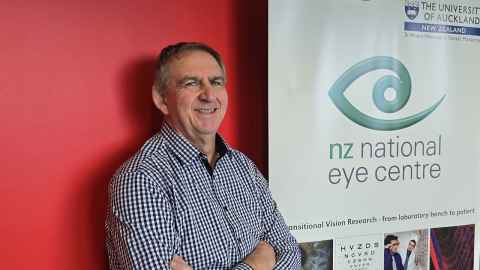Research Excellence Medals awarded for vital contribution to society
1 July 2025
The 2025 Te Taumata Rangahau Celebrating Research Excellence Award winners recognise the achievements of University researchers at all levels of an academic career.

The vital contributions to society from three leading academics have been acknowledged through the University of Auckland’s top research award for the year, the Research Excellence Medal.
Professor Caroline Foster, an internationally recognised legal scholar, is shaping a more effective and equitable international legal system. Professor Melinda Webber is a leading indigenous education researcher whose work continues to transform education here and internationally. Professor Paul Donaldson and colleagues at the Molecular Vision Research Cluster (MVRC) are behind a significant breakthrough that redefines how the eye lens is understood, transforming cataract science.
Deputy Vice-Chancellor, Research and Innovation, Professor Frank Bloomfield congratulated the three Research Excellence Medal winners. He said, “Each of these researchers is a leading figure in their field and their insights and work will continue to influence their respective fields for many years to come.”
The Reseach Excellence Medals are the premier awards in the 2025 Te Taumata Rangahau Celebrating Research Excellence Awards, recognising the important role of research at Waipapa Taumata Rau, University of Auckland. Professor Bloomfield said, “These awards acknowledge excellence at every stage of an academic career, from doctoral candidates to our senior academics. It’s a welcome opportunity to pause and reflect on the amazing research that goes on at our University.”
Professor Foster’s research focuses on improving how international law protects the environment and human health. Her work on international dispute resolution, supported by the Royal Society’s Marsden Fund and published by top academic presses, has influenced legal thinking on how courts handle environmental and health disputes.
She is also advancing the use of facilitative compliance mechanisms (FCMs) as alternatives to traditional litigation. Collaborating with global experts, Professor Foster’s findings will be presented at the prestigious Hague Academy in 2026. Her research has had real-world impact, including advising the International Union for the Conservation of Nature (IUCN) in major climate cases and contributing to legal arguments cited at the International Court of Justice.
Beyond the courtroom she co-leads international efforts to reform trade law for environmental sustainability, has advised on New Zealand’s pandemic treaty negotiations, and works on Antarctic environmental protection.

Professor Webber’s research draws on mātauranga Māori and social psychology to redefine success for Māori learners by placing Māori knowledge, values, and community perspectives at the heart.
Her work has empowered schools, whānau, and iwi to better support Māori learner engagement and well-being. This has reshaped the way education is delivered and understood across the country. Her Rutherford Discovery Fellowship (2018–2023) led the largest independent education study ever conducted in Aotearoa, involving nearly 27,000 students, families and teachers across 102 schools.
This research has generated an extensive body of knowledge, including dozens of peer-reviewed articles, books, reports, and keynotes. It has directly influenced Ministry of Education curriculum documents, school-community partnerships, and iwi-led initiatives—making a tangible difference to the lives of learners, particularly Māori youth.

Professor Donaldson and the Molecular Vision Research Cluster focus on age-related nuclear (ARN) cataract, the leading cause of untreated blindness. Their most significant breakthrough has been redefining how the eye lens is understood.
Challenging the long-standing belief that the lens is a passive optical component, MVRC researchers discovered that the lens actively maintains its function through a unique internal microcirculation system. This system helps deliver antioxidants and nutrients, control volume and preserve clarity – insights that have transformed cataract science globally.
The team is now developing targeted antioxidant therapies to delay cataract onset to offer a potential alternative to surgery. This pioneering work promises to improve quality of life, reduce healthcare costs and reshape cataract treatment for aging populations around the world.
The Te Taumata Rangahau Celebrating Research Excellence Award winners 2025 in the remaining categories are:
Research Impact Awards
Associate Professor Andrew McDaid, Faculty of Engineering and Design, has founded three start-up companies, delivered impact through 20+ research projects with the NZ MedTech industry (primarily with Fisher & Paykel Healthcare) and established the Entrepreneurial Academic Group (EAG) to support his academic colleagues on their journey to impact.
Dr Annette Lasham, Faculty of Medical and Health Sciences, Dr Nicholas Knowlton, Adele Gautier and Sue Kleinsman of the Breast Cancer Foundation NZ and clinical experts Dr Reena Ramsaroop and Dr Vernon Harvey were the multidisciplinary team that produced the first “state of the nation” report on breast cancer, titled 30,000 Voices: Informing a Better Future for Breast Cancer in Aotearoa New Zealand. The report has significantly influenced health policy and practice across New Zealand. Its findings have directly contributed to the development of 10 out of 27 new draft breast cancer quality performance indicators released by Te Aho o Te Kahu – Cancer Control Agency.
Associate Professor Nicholas Shears, Faculty of Science, has driven ground-breaking research on coastal ecosystems, with a focus on Marine Protected Areas (MPAs), showing how they can be powerful tools for restoring ocean health, —particularly vulnerable temperate reef ecosystems. He and his team’s research has directly influenced fisheries and resource management outcomes across the country, prompting catch limit reductions, fishery area closures, and efforts to restore kelp habitats.
Dr Sarah Foster-Sproull, Faculty of Arts and Education, has developed critically-acclaimed choreographic productions for companies including the Royal New Zealand Ballet (RNZB) and the New York City Ballet (NYCB). She is a co-researcher in the Horizon Europe project d@rts, utilising ballet to challenge historic hierarchies and structures of some dance company environments.
Associate Professor Sarah-Jane Paine, Tuhoe, Faculty of Medical and Health Sciences, is the director of Growing Up in New Zealand (GUiNZ), New Zealand’s largest and most diverse longitudinal study of child development and wellbeing. GUiNZ has made 170 distinct contributions to policy-making to date, including issues such as paid parental leave, breastfeeding and immunisation, experiences of persistent material hardship, housing issues, and participation in arts, culture and recreation by young people. As well as influencing local and central government policy, the GUiNZ team work hard to make their research useful and accessible to community groups and initiatives working with young people and their families
Early Career Research awards
Dr Barbara Cormack, Liggins Institute, is a Senior Research Fellow and Clinical Lead for the paediatric dietitians at Starship Child Health. She is the principal investigator on a project to develop the first national Preterm Nutritional Guidelines. She is now leading the AVIatioN study, the first comprehensive evaluation of plasma vitamin status in preterm babies, to further advance safe, evidence-based neonatal nutrition.
Dr Helen Murray, Faculty of Medical and Health Sciences, is investigating the biological processes that link head injuries to neurodegenerative diseases such as Alzheimer’s disease and chronic traumatic encephalopathy (CTE). She leads a lab group examining the brain tissue of former athletes to uncover the increased risks they face for debilitating neurodegenerative conditions.
Dr Jean Allen, Faculty of Arts and Education, has a research focus on Pacific youth, online multiplayer gaming and well-being. One aim is to raise awareness of the possible positive impacts of online gaming for Pacific youth and communities while harnessing this knowledge to enable Pacific communities to online and beyond. She is recognised as an emerging leader in the field of Pacific youth well-being and decolonial health education.
Dr Kelly Garton, Faculty of Health and Medical Sciences, is an epidemiologist and biostatistician exploring the political economy of ultra-processed foods. Her research investigates how trends in the import/export, investment in manufacturing, and marketing and consumption of ultra-processed products can partially explain the stalling (and possible reversal) of the previously seen decline in cardiovascular disease in New Zealand.
Associate Professor Marcelo Rodriguez Ferrere, Faculty of Law, is a respected voice in administrative law (the challenge and restraint of government power), and animal law (the regulation of the relationship between humans and animals). He has presented his research to Parliamentary Select Committee and has been consistently cited by New Zealand courts, including the Supreme Court of New Zealand.
Dr Rebecca Gladstone-Gallagher, Faculty of Science, is a marine scientist focussing on biodiversity and the climate crisis. Her research links ecological state, trends, and processes in coastal marine ecosystems to human values, impacts, and opportunities for science based solutions to environmental crises. In 2024 she was the NZ National Champion for the Frontiers Planet Prize for research contributing to solving the planetary crises.
Dr Siobhan Tu’akoi, Faculty of Medical and Health Sciences, has a research focus on supporting Pacific communities to lead health interventions and approaches to improve well-being. A current project involves the co-design of rheumatic fever prevention interventions with Pacific communities.
Media contact: mediateam@auckland.ac.nz
The Te Rau Hiringa Professional Staff Research Excellence Awardees for 2025 will be announced shortly. The 2025 winners will receive their awards at a special ceremony to be held on 23 October.